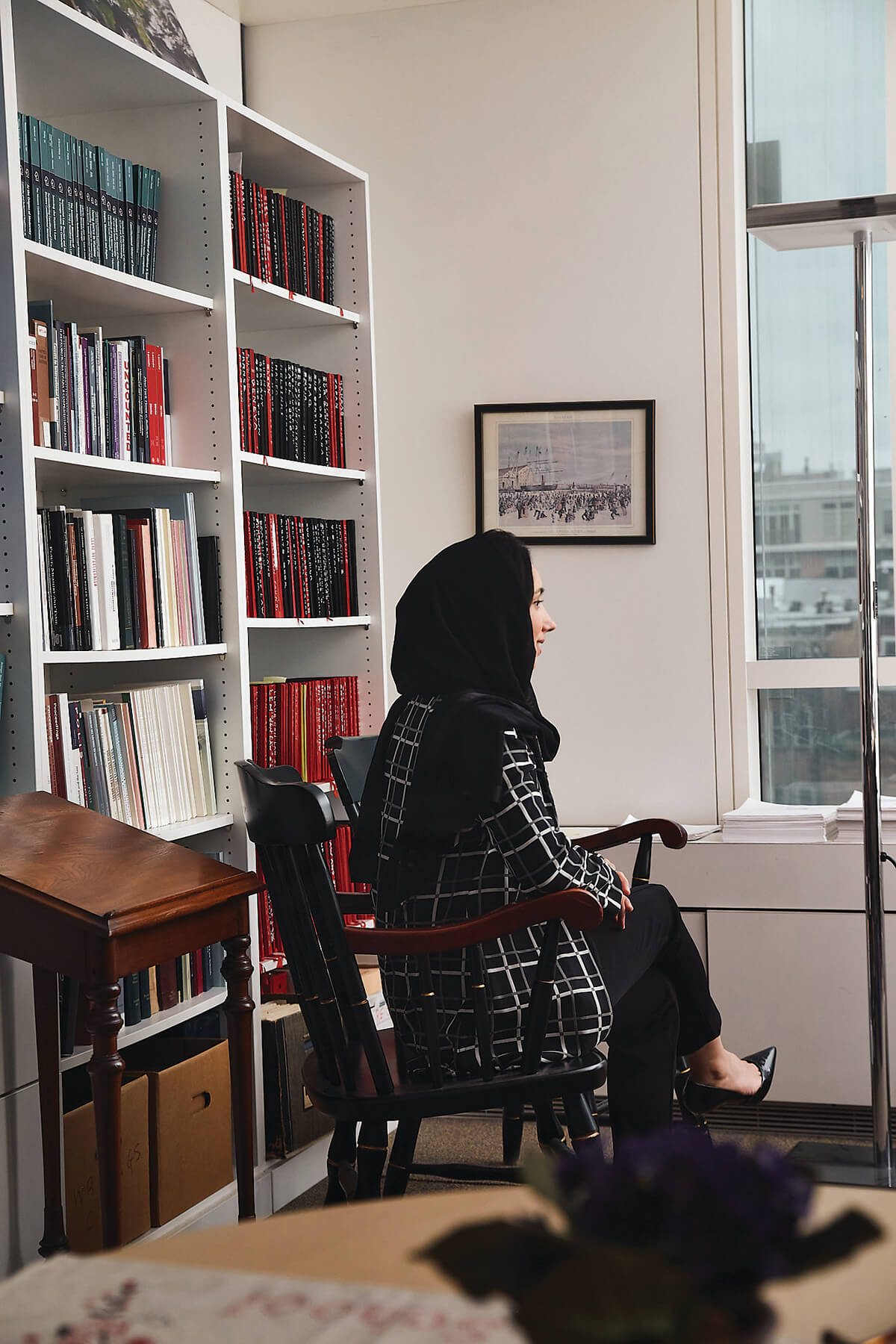News & Community
Former Afghan Refugee Set to Graduate from the University of Baltimore School of Law
The fourth-year law student is from a village in the Kunduz Province, which didn’t even have a public school until U.S. troops dislodged the Taliban around 2003. She’ll take the Maryland bar exam in July.

One day at the Islamic school near her village in northern Afghanistan, Soraya Hosseini made friends with a new girl, “my mosque-mate,” who soon told the inquisitive Soraya that she also attended a public school.
“She just said, ‘You can come with me,’” Soraya recalls, sitting in an empty, six-floor classroom of the University of Baltimore School of Law. “I later followed her to the school, and she told me that her mom was a teacher. For me, that was shocking. I’d never heard of a woman teacher. I never heard of public schools.”
Soraya’s father, a farmer, and mother, a homemaker, did not read or write, and none of her four older siblings ever attended public school. Her Kunduz Province village didn’t even have a public school until 2003-2004, after U.S. troops had dislodged the Taliban, the fourth-year evening law student explains.
When she confided to a sister that she’d started going to school with her friend, she was told she must not let anyone find out. Her uncle, a fundamentalist with multiple wives, would kill her if he learned. A sympathetic village woman sewed her a uniform, which she carried in a bag to and from classes. Pencils and books stayed at school, a practice that continued for a half-dozen years.
“Girls, and there were only a few, had to graduate by 14. That’s when they are supposed to get married.”
To avoid that fate—her mother was wed at 13—Soraya moved to Kabul to help her sister and husband with their small children. But with an ulterior motive. Away from her village, she continued her education, studying and later teaching law, while also advocating on behalf of oppressed women, including some imprisoned over “moral” crimes.
Tragically, during a brief return to her village in late 2015, a rocket destroyed her family’s house, killing her father. The attack, she believes, was directed by the Taliban because she’d gone to school and worked with U.S. humanitarian groups. Recognizing she had to flee her country, she arrived at Dulles in January 2017 with a temporary visa, little money, and a few words of English. (Her name has been changed in this story out of fear of further retribution. Soraya has not had contact with her family since leaving Afghanistan.) When she asked an airport taxi driver to take her to the asylum office, he drove her to the U.S. Citizenship and Immigration field office in Baltimore.
“It was such a long drive, I thought I’d been kidnapped,” she says, wiping away tears before smiling in disbelief at the journey to the place she now calls home.
Today, more than 500 Afghan refugees live in Baltimore, almost all resettled by the International Rescue Committee since 2022 and the end of the 20-year war.
When Soraya came, there was no Afghan diaspora community, however. Turned away at the asylum office, which does not accept walk-ins, she spent months in homeless shelters. Eventually, she was introduced to several local nuns, who offered temporary accommodations at their convent.
“People began to ask if I was going to become a nun because I was living with them,” says Soraya, a practicing Muslim. “They were wonderful.”
They put her in touch with the Asylee Women Enterprise, a Catholic-associated Baltimore nonprofit that helps asylum seekers, foreign-born survivors of human trafficking, and other forced migrants rebuild their lives. They connected her to the University of Dayton, where she initially earned a master’s degree in law before landing a city government job and applying to UBalt. This year, she became the first recipient of a UBalt scholarship established by lobbyist Bruce Bereano and his son, Judge Bryon Bereano, a UBalt law grad.
She’ll take the Maryland bar exam in July.
Meanwhile, she has served as interpreter for recent Afghan immigrants and has her share of “Smalltimore” moments as well. “I’m still in touch with the nuns, but everywhere you go in Baltimore, you see people you know.”
Soraya acknowledges bouts of depression, particularly when obstacles have seemed overwhelming. But she also sees negative portrayals of Baltimore and believes there’s hope in her story.
“I love Baltimore and I love that it’s diverse,” she says. “It’s a beautiful place and it has a lot of people who are really kind. I don’t want to live anywhere else.”
When asked if there have been any new developments beyond graduation plans, she adjusts her head scarf and smiles again.
“I bought a car. I’m the first in my family to drive now, too.”